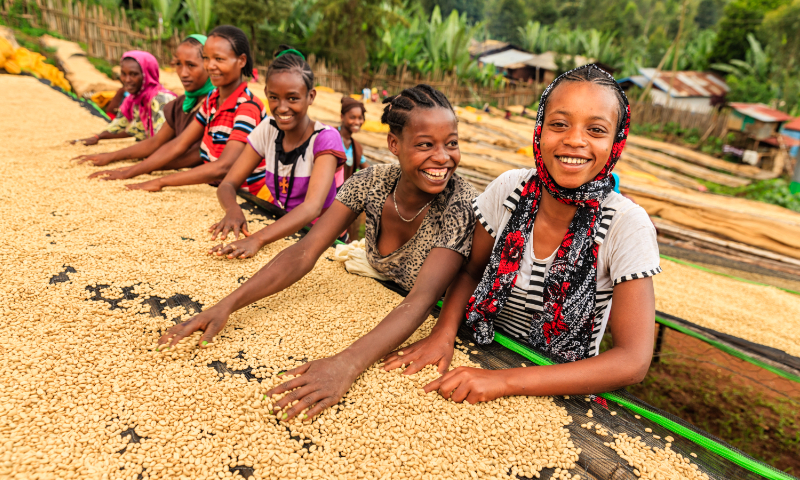
Women sort coffee beans at a farm in Ethiopia. File photo: VCG
"Three, two, one, get (Rwanda coffee) on the cart! Sold out!" Back in May 2020, James Kimonyo, Rwandan Ambassador to China, joined an online livestreaming event on e-commerce platform Taobao, during which he sold nearly 1.5 tons of Rwanda coffee beans in just a few seconds, before even finishing an introduction to the products. This amount is equivalent to Rwanda's total coffee bean sales from the previous year.
This was not the first batch of African coffee exported to or sold into the Chinese market. However, it was an impressive feat that boosted the confidence of African coffee farmers in exporting their products to China.
In recent years, Africa's agricultural exports to China have been steadily increasing, playing a crucial role in boosting the development of Africa's agricultural sector.
The agricultural partnership between China and Africa spans from traditional farming to the entire production, transport and sales value chain, supporting Africa to modernize and advance high-quality development.
As China is one of the fastest-growing coffee markets in the world, the coffee trade has become an important part of China-Africa economic and trade cooperation, African coffee exporters told the Global Times.
China imported $165.1 million worth of coffee products from Africa in 2023, according to statistics from the General Administration of Customs of China.
Ethiopia's coffee exports to China have been growing in recent years, and the efficiency of exporting coffee from Ethiopia to China has been increasing from time to time, Munteha Jemal, Plenipotentiary Minister of the Ethiopian Embassy in China, told the Global Times on Friday at Ethiopia's exhibition booth at the 2024 Cafe Show China held in Beijing.
"We are promoting our coffees to Chinese people, especially the younger generation, who are becoming more and more coffee lovers," said Jemal.
A valuable industryCoffee is a major industry in Africa, employing a large number of people on coffee farms. The coffee sector is crucial to the economic development of many African countries.
"It is considered the livelihood of the local people and is passed down from generation to generation," Zimulinda Victorien, a Rwanda coffee exporter told the Global Times.
For example, about 1.7 million households in Uganda are engaged in coffee farming and close to 5 million people were employed in the overall coffee industry in 2023, said Uganda Coffee Development Authority.
Amumpaire Freedom, a coffee farmer from Uganda, now resides in Shenzhen, South China's Guangdong Province. He has partnered with Chinese collaborators to establish a company - Shenzhen-based Moon Mountain Co - dedicated to promoting organic Ugandan coffee.
"Ugandan businesses are trying to channel and venture into the Chinese market for its vast potential, especially targeting the young population," Freedom told the Global Times on Friday at the 2024 Cafe Show China.
The company currently conducts business both online and offline. "We also attend offline fairs. We own a coffee shop in Shenzhen while also supplying coffee beans to local shops door-by-door," said Freedom.
For online sales, Freedom's company has a shop on e-commerce platform Taobao.
Sales on the cloudE-commerce has played a vital role in promoting African coffee and other agricultural products sourced from the continent.
As one of the latest examples, in May 2024, Shanghai launched the 2024 Shanghai Silk Road E-commerce Carnival, under which Meione (Shanghai) Network Technology Co conducted a special promotion event exclusively for African products.
Raw materials such as cocoa cubes, coffee extracts and tea extracts come from African countries including Ethiopia, Kenya, Rwanda and Uganda, Meione said in a statement shared with the Global Times.
"Through consumer buy-in and support, combined with the power of e-commerce, the partnership between Ethiopia and China will benefit coffee farmers, small- and medium-sized enterprises in Ethiopia," Jemal said.
Jemal also said that Ethiopia has signed an agreement with the e-commerce platform JD.com to sell its coffee and other products.
"We are also exploring options such as developing other e-commerce platforms. We also encourage our people to get trained in e-commerce skills in China. Alibaba has delivered very good online training for young people in Africa," Jemal noted.
China has shared development experience in e-payment and smart logistics and helped Ethiopia, South Africa, Cote d'Ivoire and other countries build e-commerce ecosystems, according to media reports.
With the strong support of digital transformation and the growth of e-commerce platforms, some intermediary steps in coffee sales have been eliminated. For example, Rwandan coffee farmers earn $4 more for every kilogram of beans they sell, according to media report.
Facilitating tradeIn 2023,
China-Africa trade reached a record high of $282.1 billion, with coffee listed as an important agricultural product, per official data.
The increasing imports of African coffee products are in part attributed to the "green channel" granted to some African agricultural products, including flowers and coffee beans, a number of African exporters and Chinese importers said.
An Ethiopian coffee exporter said that after a 20-day journey by sea, coffee beans harvested from farms in Ethiopia's Kaffa coffee-producing region can be shipped to China via the Port of Djibouti. Previously, journeys used to take more than 40 days.
"The procurement costs of African coffee beans had been high due to the numerous circulation links, which discouraged many Chinese coffee businesses," a Changsha-based Chinese coffee importer surnamed Xiao told the Global Times.
However, this situation has improved due to China's "green channel" for certain African agricultural products and cooperation platforms like the China-Africa Economic and Trade Expo (CAETE), first held in 2019.
"Chinese coffee businesses can directly connect with African coffee planting cooperatives to achieve face-to-face communication, production selection and procurement at the CAETE hosted by Hunan Province in its capital city Changsha," Xiao said.




